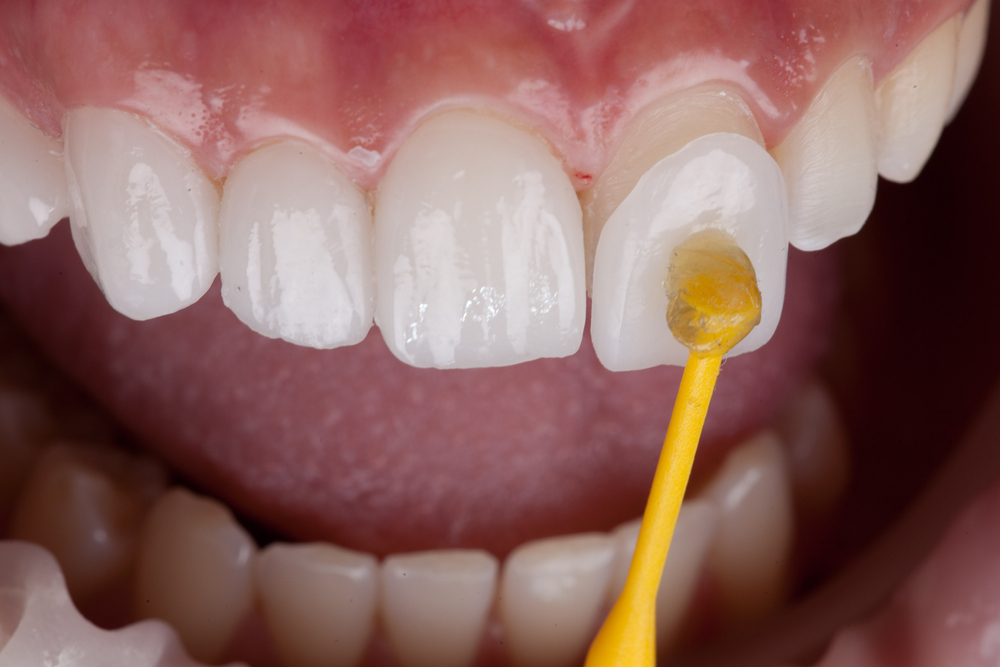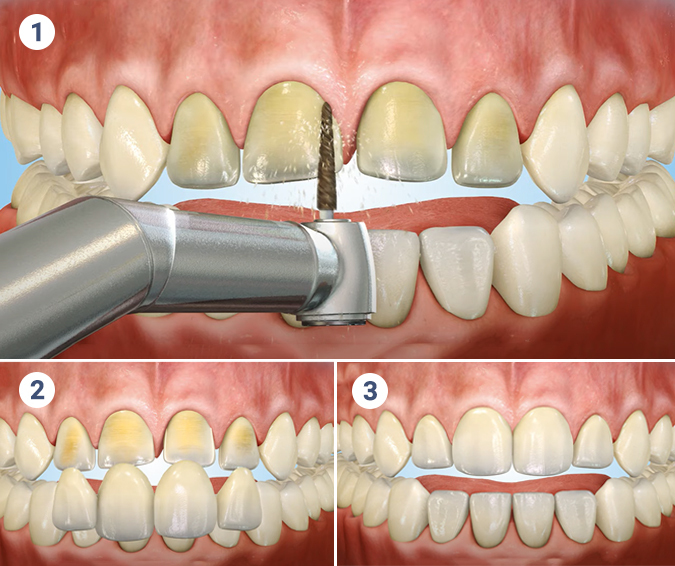The Total Overview of Veneers: Kinds, Utilizes, and Their Impact on Your Smile
Veneers work as a prominent service for individuals looking for to improve their oral appearances. These custom-crafted shells can effectively mask imperfections such as staining and spaces. With two key kinds offered, porcelain and composite material, each deals unique benefits and limitations. The effect of veneers expands beyond plain appearance, affecting self-worth and social interactions. Understanding their kinds and benefits is necessary. What might this suggest for one's total quality of life?
Understanding Veneers: What They Are and How They Function
Veneers are thin shells, normally made from porcelain or composite material, that are custom-crafted to fit over the front surface area of teeth. They serve both functional and aesthetic objectives, providing a remedy for numerous oral flaws such as staining, gaps, and minor imbalances. By sticking to the tooth enamel, veneers produce an all-natural look while boosting the form and shade of the teeth.
The process normally entails an initial appointment, where a dental expert analyzes the patient's demands and talks about wanted results - What Are Veneers. Following this, a marginal quantity of enamel might be gotten rid of to accommodate the veneer. Perceptions of the teeth are after that required to ensure a precise fit. When made, the veneers are adhered firmly to the teeth making use of an unique oral adhesive. This treatment not only improves the smile's appearance however also aids secure the underlying teeth from additional damages, making veneers a popular choice for several seeking a smile transformation
Sorts of Veneers: Porcelain vs. Composite Material
The difference in between porcelain and composite resin veneers lies in their material make-up and features. Each type offers differing degrees of cost, sturdiness, and long life, influencing people' choices based on their private requirements. Recognizing these distinctions is important for making a notified decision concerning oral improvements.
Material Differences Discussed
While both porcelain and composite resin veneers offer the same cosmetic function, they vary substantially in product homes, longevity, and visual results. Porcelain veneers are crafted from a ceramic product that mimics the natural translucence of teeth, providing a realistic appearance. Their smooth surface is resistant to discoloration, making them an appealing option for those seeking a lasting visual. On the other hand, composite material veneers are made from a tooth-colored plastic product, supplying versatility and ease of application. They might not attain the exact same level of illumination or translucency as porcelain. In addition, composite veneers can be more conveniently formed and fixed, making them a more adaptable alternative in particular oral scenarios. Each kind provides distinct advantages tailored to individual choices.
Durability and Sturdiness
Durability and toughness are substantial elements when comparing porcelain and composite material veneers. Porcelain veneers are understood for their strength, frequently enduring 10 to 15 years with proper treatment. Their strength against tarnishing and chipping makes them a preferred option for people seeking lasting results. On the other hand, composite resin veneers commonly have a shorter lifespan, balancing 5 to 7 years. While they can be fixed much more conveniently if damaged, they are a lot more susceptible to put on and staining with time. The option between these products usually relies on the individual's lifestyle, visual objectives, and upkeep preferences. Inevitably, recognizing the differences in long life and sturdiness can lead people in selecting the veneer kind that finest suits their demands.
Price Contrast Insights
Price is a vital factor to consider when selecting between porcelain and composite resin veneers. Porcelain veneers typically vary from $800 to $2,500 per tooth, mirroring their durability, visual allure, and resistance to staining. These veneers need a more considerable treatment and specialized laboratory work, contributing to their higher price tag. In contrast, composite resin veneers are typically extra affordable, setting you back in between $250 and $1,500 per tooth. They can be used in a solitary see, which reduces labor expenses. However, composite veneers may need a lot more frequent substitutes, potentially enhancing lasting expenditures. Eventually, the choice in between porcelain and composite resin veneers depends upon private budgets and desired outcomes, stabilizing initial expenses versus durability and visual results.
The Advantages of Finding Veneers for Your Smile
Picking veneers offers significant benefits for those seeking a boosted smile. Their improved aesthetic allure can change the appearance of teeth, while their stain-resistant residential properties guarantee an enduring illumination - Porcelain Veneers. This combination makes veneers a prominent choice for people looking to accomplish a perfect smile
Improved Aesthetic Charm
Veneers usually emerge as a preferred option due to their transformative visual advantages when people seek to improve their smiles. These thin shells, generally made of porcelain or composite material, can effectively conceal imperfections such as chips, spaces, and misalignment. By imitating the natural appearance of teeth, veneers give a seamless, radiant smile. Their adjustable nature enables a tailored technique, making it possible for people to pick tones and forms that finest match their face functions. Additionally, veneers can create an uniform appearance, improving total face proportion. This visual enhancement not just boosts confidence but can likewise favorably influence individual partnerships and social communications, making veneers a preferred option for those wanting to accomplish a brighter, more appealing smile.
Tarnish Resistance Advantages
Veneers not only boost aesthetic appeal but likewise supply substantial stain resistance, making them an attractive option for people worried about maintaining a brilliant smile. Made up of sturdy materials such as porcelain or composite resin, veneers are much less permeable than all-natural teeth, which helps prevent the absorption of spots from usual culprits like coffee, tea, and red wine. This intrinsic tarnish resistance enables people to enjoy their favored beverages without fretting concerning staining. Dental Veneers. Furthermore, the smooth surface area of veneers makes them simpler to clean, further improving their durability and preserving their excellent appearance. Because of this, veneers supply a sensible solution for those looking for both appeal and capability in their oral care
The Process of Getting Veneers: What to Expect

The procedure of obtaining veneers may appear daunting, recognizing the actions included can minimize issues. A consultation with a why not try this out dental practitioner is needed to figure out if veneers are the suitable solution for the individual's oral concerns. Throughout this visit, the dental professional will review preferred outcomes and take impressions of the teeth.
Next, a 2nd visit is arranged for tooth prep work, where a percentage of enamel is normally gotten rid of to fit the veneers. Short-term veneers may be positioned while the customized ones are crafted in an oral laboratory, which usually takes a pair of weeks.
When all set, the dental professional will certainly place the veneers, making certain appropriate fit and shade before bonding them to the teeth utilizing an unique adhesive. After final modifications, the dental professional will certainly offer advice on care. Recognizing these steps can aid clients feel more comfortable and notified throughout the veneer procedure.
Maintenance and Take Care Of Your Veneers
Preserving veneers calls for constant treatment to assure their durability and appearance. Proper dental health is necessary; brushing two times daily with a non-abrasive tooth paste and flossing routinely aid protect against plaque buildup around the veneers. Furthermore, routine oral examinations are crucial for monitoring the condition of the veneers and dealing with any type of prospective concerns early on.
Patients need to prevent tough foods and extreme pressure when biting to protect against damages. It's likewise advisable to limit consumption of staining substances, such as coffee, tea, and red wine, as these can affect the veneers' color over time.

Changing Your Smile: Real-Life Impact of Veneers
A radiant smile can considerably boost one's self-confidence and total look. For many individuals, veneers serve as a transformative remedy, effectively dealing with different oral problems such as staining, spaces, and misalignment. These slim coverings, tailor-made to fit over the front of the teeth, can produce a harmonious and aesthetically pleasing smile.
Real-life cases illustrate the extensive influence veneers can have. Individuals commonly report a prompt boost in self-confidence and social interactions following their treatment. The newly found confidence can cause even more opportunities in personal and professional life, as individuals really feel even more likely to involve and express themselves.
Additionally, the emotional benefits prolong past plain appearance; many experience boosted mental well-being as they welcome their smiles. Consequently, veneers not only enhance physical features yet likewise contribute significantly to total top quality of life, underscoring their worth in cosmetic dentistry.
Regularly Asked Concerns
Just How Lengthy Do Veneers Normally Last Before Requiring Substitute?
Veneers generally last in between 10 to 15 years before calling for substitute. Factors such as dental hygiene, dental routines, and the type of product utilized can affect their longevity and total toughness. Regular oral check-ups are a good idea.
Can Veneers Be Removed, and if So, Exactly how?
Yes, veneers can be removed. A dental professional typically utilizes customized tools to thoroughly separate them from the teeth, ensuring minimal damage to the underlying enamel, usually followed by required changes or reconstructions for perfect aesthetics.
Are Veneers Suitable for Everyone's Dental Condition?

Will Getting Veneers Pain or Require Anesthesia?
Obtaining veneers normally involves marginal discomfort, and many individuals receive neighborhood anesthetic to ensure a pain-free experience. Sensitivity might occur briefly afterward, however most discover the process tolerable and are pleased with the results.
How Do Veneers Affect Tooth Sensitivity After Positioning?
Veneers can briefly raise tooth sensitivity as a result of the removal of enamel and the bonding procedure. The majority of individuals experience a reduction in level of sensitivity in time as the teeth get used to the new veneers.
Veneers are thin coverings, typically made from porcelain or composite resin, that are custom-crafted to fit over the front surface of teeth. Porcelain veneers are crafted from a ceramic material that mimics the natural transparency of teeth, offering a lifelike appearance. Porcelain veneers normally range from $800 to $2,500 per tooth, showing their sturdiness, aesthetic allure, and resistance to discoloration. In comparison, composite resin veneers are typically more budget-friendly, costing in between $250 and $1,500 per tooth. Composed of long lasting products such as porcelain or composite material, veneers are much less permeable than natural teeth, which assists avoid the absorption of stains from common click site culprits like coffee, tea, and red white wine.